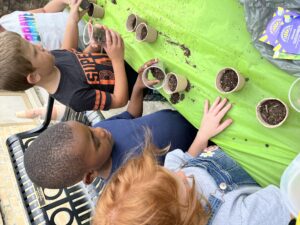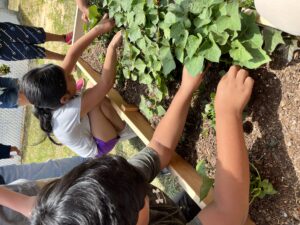Ag in the Classroom
go.ncsu.edu/readext?975809
en Español / em Português
El inglés es el idioma de control de esta página. En la medida en que haya algún conflicto entre la traducción al inglés y la traducción, el inglés prevalece.
Al hacer clic en el enlace de traducción se activa un servicio de traducción gratuito para convertir la página al español. Al igual que con cualquier traducción por Internet, la conversión no es sensible al contexto y puede que no traduzca el texto en su significado original. NC State Extension no garantiza la exactitud del texto traducido. Por favor, tenga en cuenta que algunas aplicaciones y/o servicios pueden no funcionar como se espera cuando se traducen.
Português
Inglês é o idioma de controle desta página. Na medida que haja algum conflito entre o texto original em Inglês e a tradução, o Inglês prevalece.
Ao clicar no link de tradução, um serviço gratuito de tradução será ativado para converter a página para o Português. Como em qualquer tradução pela internet, a conversão não é sensivel ao contexto e pode não ocorrer a tradução para o significado orginal. O serviço de Extensão da Carolina do Norte (NC State Extension) não garante a exatidão do texto traduzido. Por favor, observe que algumas funções ou serviços podem não funcionar como esperado após a tradução.
English
English is the controlling language of this page. To the extent there is any conflict between the English text and the translation, English controls.
Clicking on the translation link activates a free translation service to convert the page to Spanish. As with any Internet translation, the conversion is not context-sensitive and may not translate the text to its original meaning. NC State Extension does not guarantee the accuracy of the translated text. Please note that some applications and/or services may not function as expected when translated.
Collapse ▲It’s been a busy year for Extension’s youth Ag Education and Outreach Program. The program primarily brings our Ag in the Classroom curriculum to Sampson County elementary aged children, as well as occasional events offered to middle and high school youth. Educating our youth on the importance of agriculture is critical, particularly with the tremendous contribution Sampson County provides to our local, national and worldwide food supply.
Ag in the Classroom began in 2021 and has been introduced at many elementary schools across the county, as well as our libraries. The program delivers learning materials for classrooms through reading material, visual aids, and virtual means, such as videos, curriculum, virtual and on-farm tours, as well as hands on activities, such as growing sweetpotatoes in raised beds for classrooms to harvest in the fall! Being that Sampson leads NC in sweetpotato production, and we are the second largest pork producing county of both the state and the US, we focus mostly on these two commodities.
Through partnership with Sampson County Farm Bureau, the program has also provided fourteen agricultural focused picture and chapter books to each public and private school library across the county and all Sampson County Public Libraries. These monthly books include a variety of topics, like growing and eating fruits and vegetables, beekeeping, soil science, and livestock.
We especially would like to thank Sampson County United Way and Sampson County Farm Bureau for funding the program and providing volunteers to assist with program delivery. We’re also thankful for partnering with North Carolina Farm Bureau Ag in the Classroom, the NC Sweetpotato Commission, NC Pork Council, and the NC Department of Agriculture Farm to School Program, and our Sampson County Libraries for their support of this great youth learning experience. We appreciate local farms for hosting these young visitors, such as Hubb’s Farm, T&J Farms, Williams Produce, and Andy Herring Farms.
This year, 663 children participated in Sampson County’s Ag in the Classroom events and activities. Schools and teachers interested in Ag in the Classroom to their curriculum may contact Eileen Coite at the N.C. Cooperative Extension Center at 910-592-7161.





